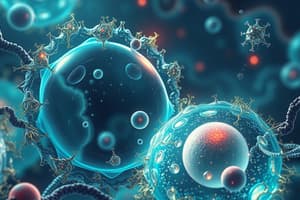Podcast
Questions and Answers
What is the process by which cells convert nutrients into energy and produce essential molecules?
What is the process by which cells convert nutrients into energy and produce essential molecules?
Metabolism
Describe the ability of cells to increase in size and replicate, creating new cells.
Describe the ability of cells to increase in size and replicate, creating new cells.
Growth and division
What is the term for the process by which cells develop into specific cell types, each with unique functions?
What is the term for the process by which cells develop into specific cell types, each with unique functions?
Differentiation and specialization
Explain the mechanisms by which cells exchange signals to coordinate activities and respond to their environment.
Explain the mechanisms by which cells exchange signals to coordinate activities and respond to their environment.
What is the function of the cell membrane?
What is the function of the cell membrane?
What is the function of the cytoskeleton in a cell?
What is the function of the cytoskeleton in a cell?
How do cells communicate with each other?
How do cells communicate with each other?
Why is understanding cell function important in the context of disease?
Why is understanding cell function important in the context of disease?
What role does cell communication play in the development of multicellular organisms?
What role does cell communication play in the development of multicellular organisms?
How does cell biology contribute to the development of therapeutic strategies?
How does cell biology contribute to the development of therapeutic strategies?
Study Notes
Cell Function: The Heartbeat of Life's Building Blocks
Cell biology is a field of science that delves into the structure, function, and behavior of cells — the fundamental units of life. Cells perform a myriad of tasks, from basic metabolism to complex communication with their environment. This article will focus on the core functions of cells, highlighting their diverse roles and the mechanisms underlying these activities.
Cell Function: A Composite of Processes
The function of a cell is a composite of many processes, each integral to its health and survival. Several key functions include:
- Metabolism: The process by which cells convert nutrients into energy and produce essential molecules.
- Growth and division: The ability to increase in size and replicate, creating new cells.
- Differentiation and specialization: The process by which cells develop into specific cell types, each with unique functions.
- Communication and signaling: The mechanisms by which cells exchange signals, both within and between organisms, to coordinate activities and respond to their environment.
Cellular Components and Their Functions
The cell's internal environment is organized into specialized structures and compartments that facilitate its functions. These include:
- Cell membrane: A selectively permeable barrier that separates the interior of the cell from its external environment, controlling the exchange of substances between the cell and its surroundings.
- Cytoskeleton: A network of protein filaments that provides structural support and facilitates cell movement and division.
- Organelles: Specialized structures with specific functions, such as mitochondria (energy production), endoplasmic reticulum (protein synthesis), and lysosomes (degradation).
Cell Function: A Dynamic Process
Cell function is a dynamic process, constantly changing in response to internal and external stimuli. For example, a cell may change its shape to migrate to a new location or adjust its metabolism to meet energy demands.
Cells also communicate with one another, often through the release of signaling molecules that can influence the behavior of nearby cells. This coordinated communication is essential for the development of multicellular organisms and the maintenance of tissue and organ function.
Cell Function in Health and Disease
Many diseases are caused by dysfunctional cells, whether due to genetic mutations, environmental factors, or other causes. A cell that is unable to perform its normal functions may contribute to the development and progression of diseases such as cancer, neurodegenerative disorders, and infectious diseases.
Understanding cell function is crucial for developing therapeutic strategies to treat and prevent diseases. Researchers are constantly studying cells to identify their molecular mechanisms and develop new treatments that target cellular processes to improve human health.
In conclusion, cell biology is a fascinating field that sheds light on the intricate workings of life's building blocks. The study of cell function provides valuable insights into the molecular mechanisms underlying human health and disease, paving the way for innovative therapies and treatments in the future.
Studying That Suits You
Use AI to generate personalized quizzes and flashcards to suit your learning preferences.
Description
Explore the fundamental roles and processes within cells, from metabolism and growth to communication and specialization. Learn about the key components like cell membrane, organelles, and cytoskeleton, and how they contribute to cell function. Discover the significance of studying cell function in health, disease, and therapeutic development.





